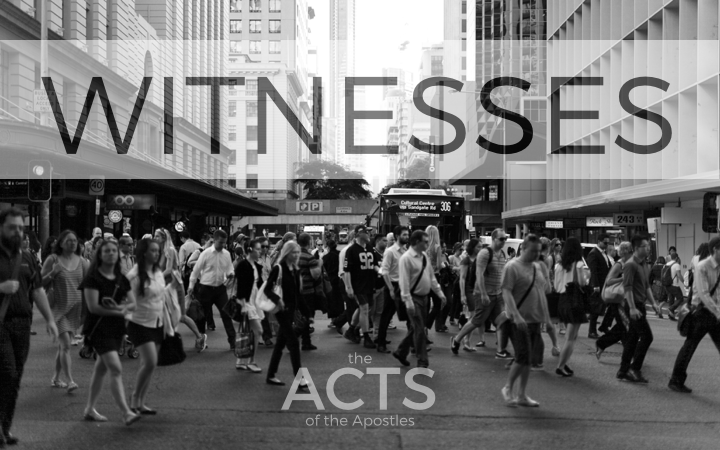Big Idea:
The passage we’ll look at next week stretches from 4:32 to 5:42.
If the Gospel is from men, it’ll falter. If it’s from God, it’s unstoppable.
Key Verses:
5:14 – In spite of obstacles, God is calling people to himself.
5:29-32 – We must obey God, rather than men.
5:38-39 – If it’s from men, it’ll fail. If it’s from God, it’s unstoppable.
5:41-42 – The world is seen not through the eyes of men, but of God.
Structure:
4:32-36 – The people of God: of one heart and mind.
5:1-11 – Internal Problems: Trying to fool God.
5:12-16 – The people of God: Curiously attractive.
5:17-40 – External Problems: Trying to oppose God.
5:41-42 – But this is God at work, so there’s no stopping it.
Observations:
[ut_togglegroup]
[ut_toggle title=”4:32-36″]
4:36 – “He was the encourager, the advocate par excellence of all the characters in Acts. When the Christians in Jerusalem shied away from Paul after his conversion, Barnabas interceded and introduced him to them (9:26f.). When Paul refused to take Mark on his second missionary journey, Barnabas took up for Mark (15:36-39). When the Christians of Jerusalem became concerned over the orthodoxy of the Antiochene Christians in their witness to Greeks, Barnabas again served as intercessor, saw the gracious work of the Antiochene Christians, and encouraged them (11:20-23). Indeed, 11:24 well sums up the portrait of this “Son of Encouragement”: “He was a good man, full of the Holy Spirit and of faith.”” Polhill
[/ut_toggle]
[ut_toggle title=”5:1-11″]
In his Gospel, Luke gave the most warnings (from Jesus) about Money. It ensnared Judas (Luke 22:5; Acts 1:18), the rich young man (Luke 18:18-23), and the rich fool (Luke 12:15-21).
5:3 – While the community of believers is described elsewhere (4:32) as being one in heart & mind, Ananias can not be described like that. He is a man divided – one foot in the God’s kingdom, one foot in the worlds kingdom.
5:4 – Ananias’ sin is not in keeping back part of the money, but in pretending that he had given it all.
5:4 – The parallelism of Verses 3 & 4 indicate something about the Holy Spirit, that He is God.
5:11 – This is the first use of the word “church” (Gathering) in Acts).
[/ut_toggle]
[ut_toggle title=”5:12-16″]
Notice in this section the mix of both curiosity from people of the gathering of the believers and the miracles of the apostles, and their stand-offish-ness. Even through this mixed response God was calling people to himself.
5:12 – As mentioned in last weeks passaged, Solomon’s Colonnade in the wider temple area, was where the early Christians used to meet.
[/ut_toggle]
[ut_toggle title=”5:17-40″]
5:17-18 – The Sadducees didn’t believe in angels, or the resurrection. But the very thing they didn’t believe in rescued the apostles, and the was declared in the temple.
5:26 – The captain feared the people because of what was happening. Wrong person to fear.
5:28 – And the high priest can’t even bring himself to say Jesus’ name.
5:29-32 – Peter’s programmatic statement once again. He’s very clear what the pecking order is, and what it is that’s motivating him.
5:34-39 – Gamaliel was a teach of Saul (acts 22:3), a celebrated teacher of the law. This may be how Luke knew what happened here, because there’s a good chance Paul was present.
5:37 – Theudas was probably someone written about by Josephus the historian, who opposed the census carried out by Quirinius in AD 6. He was killed, but it gave rise to the Zealots, a splinter group.
5:39 – We don’t want to be utilitarian, “Because it works, it’s from God.” But we must affirm that if God is behind it, it will achieve what God wants it to achieve.
5:40 – The flogging they received was probably the same as Paul refers to himself in 1 Corinthians 11:24. The 39 lashes was meant to be a sign of mercy, rather than severity, in case of a miscount. But it was bad enough that people had died from these lashes.
[/ut_toggle]
[ut_toggle title=”5:41-42″]
The disciples response is anything but sensible. They rejoice not because they were let off, but because they were associated (visibly) with Jesus, and then they went off and did exactly what they’d been told not to do and what they received the lashes for.
[/ut_toggle]
[/ut_togglegroup]
Application:
Three questions for reflection this week:
1 – Who works for whom?
The disciples don’t question their circumstances, and the realise the pecking order in the world (5:29).
They don’t use God to justify their own ends like Gamaliel does (5:38-39) in some sort of faux spirituality.
The disciples know they don’t always know how God is working, but they trust that he is. And they can do this because they know what God is like towards them.
Do we trust God in the same way – in the good and in the hard?
Who defines what triumph is?
There’s an attraction to the miraculous, and the dramatic, and the obvious. But the work of God in our lives and our hearts is often less noticeable, sometimes more painful, but no less (arguable more) important.
The miracles are important in Acts, but the thing that it keeps coming back to is the message of the Resurrection (5:20, 29-32, 42). This is the message that brings forgiveness and gives people the chance to have God’s Spirit in them.
And triumph for the disciples is not conquering all, it’s remaining faithful (5:41).
What do we see as the wins in our own lives?
What does Growth look like?
Do we assume that just because it’s obvious and appreciated by all it’s growth? Can’t God (and doesn’t God) use the hard times in our lives to grow us just as much – if not more – than the easy times?
And just because growth in the church isn’t obvious in Australia, it doesn’t mean God isn’t working.
Take China for example:
– In 1949 there were around 1 million protestants.
– In 2010 there were around 58 million protestants compared to 40 in Brazil, 36 in South Africa.
– Experts think by 2025 there will be around 160 million protestants. More than the US.
– When we add in those from the Catholic church, by 2030 the number is estimated at 247 million.
Much of this growth has been born out of persecution & struggle. God is at work. We just need to know what to look for and where.






